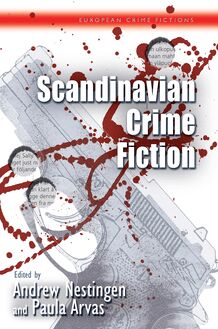-
 Univers
Univers
-
 Ebooks
Ebooks
-
 Livres audio
Livres audio
-
 Presse
Presse
-
 Podcasts
Podcasts
-
 BD
BD
-
 Documents
Documents
-
- Cours
- Révisions
- Ressources pédagogiques
- Sciences de l’éducation
- Manuels scolaires
- Langues
- Travaux de classe
- Annales de BEP
- Etudes supérieures
- Maternelle et primaire
- Fiches de lecture
- Orientation scolaire
- Méthodologie
- Corrigés de devoir
- Annales d’examens et concours
- Annales du bac
- Annales du brevet
- Rapports de stage
La lecture à portée de main
Vous pourrez modifier la taille du texte de cet ouvrage
Découvre YouScribe en t'inscrivant gratuitement
Je m'inscrisContemporary French and Scandinavian Crime Fiction , livre ebook
Découvre YouScribe en t'inscrivant gratuitement
Je m'inscrisEn savoir plus
Vous pourrez modifier la taille du texte de cet ouvrage
En savoir plus

Description
This book offers a study of Danish, Norwegian, Swedish and French crime fictions covering a fifty-year period. From 1965 to the present, both Scandinavian and French societies have undergone significant transformations. Twelve literary case studies examine how crime fictions in the respective contexts have responded to shifting social realities, which have in turn played a part in transforming the generic codes and conventions of the crime novel. At the centre of the book’s analysis is crime fiction’s negotiation of the French model of Republican universalism and the Scandinavian welfare state, both of which were routinely characterised as being in a state of crisis at the end of the twentieth century. Adopting a comparative and interdisciplinary approach, the book investigates the interplay between contemporary Scandinavian and French crime narratives, considering their engagement with the relationship of the state and the citizen, and notably with identity issues (class, gender, sexuality and ethnicity in particular).
Acknowledgements
Introduction
Part I: The Structure of Crime Fiction Revolutions
Chapter 1 – Social and Literary Models in Crisis
Chapter 2 – Individual and Collective Identities in the Twenty-First Century
PART II: Gender and Genre
Chapter 3 – Gender and Sexuality in the femikrimi and the polar au féminin
Chapter 4 – The Figure of the Prostitute
Part III: Cultures in Migration
Chapter 5 – Bled and Banlieue in French Crime Fiction
Chapter 6 – Self and Other in Scandinavian Crime Fiction
Conclusion: Closing the Case
Selected bibliography
Sujets
Informations
| Publié par | University of Wales Press |
| Date de parution | 05 juillet 2021 |
| Nombre de lectures | 0 |
| EAN13 | 9781786837202 |
| Langue | English |
Informations légales : prix de location à la page 0,1900€. Cette information est donnée uniquement à titre indicatif conformément à la législation en vigueur.
Extrait
CONTEMPORARY FRENCH AND SCANDINAVIAN CRIME FICTION
INTERNATIONAL CRIME FICTIONS
The International Crime Fictions Series aims to build on the success of its precursor, European Crime Fictions, to profile transnational and intercultural approaches to crime fiction from around the world. The extended mission of the Series is conceived to analyse and document the fruitful exchanges between creative and critical work on crime fiction in an international context today.
The scope of the Series includes literary and cultural studies, translation studies, popular culture studies, film, photography and comics, fandom studies, genre studies, and national and transnational histories of crime, writing and practice.
Series Editors
Professor Claire Gorrara, Cardiff University
Professor Giuliana Pieri, Royal Holloway, University of London
Professor Shelley Godsland, University of Amsterdam
Editorial Board
Professor M. Atack, University of Leeds
Professor John Foot, University of Bristol
Dr Katharina Hall, Swansea University
Professor Stephen Knight, University of Melbourne
Other titles in the series:
Crime Fiction in German
Crime Fiction in the City
French Crime Fiction
Iberian Crime Fiction
Italian Crime Fiction
Scandinavian Crime Fiction
INTERNATIONAL CRIME FICTIONS
CONTEMPORARY FRENCH AND SCANDINAVIAN CRIME FICTION
Citizenship, Gender and Ethnicity
Anne Grydehøj
© Anne Grydehøj, 2021
All rights reserved. No part of this book may be reproduced in any material form (including photocopying or storing it in any medium by electronic means and whether or not transiently or incidentally to some other use of this publication) without the written permission of the copyright owner except in accordance with the provisions of the Copyright, Designs and Patents Act. Applications for the copyright owner’s written permission to reproduce any part of this publication should be addressed to the University of Wales Press, University Registry, King Edward VII Avenue, Cardiff, CF10 3NS.
www.uwp.co.uk
British Library Cataloguing-in-Publication Data
A catalogue record for this book is available from the British Library.
ISBN: 978-1-78683-718-9
eISBN: 978-1-78683-720-2
The right of Anne Grydehøj to be identified as author of this work has been asserted in accordance with sections 77 and 79 of the Copyright, Designs and Patents Act 1988.
The publisher has no responsibility for the persistence or accuracy of URLs for any external or third-party internet websites referred to in this book, and does not guarantee that any content on such websites is, or will remain, accurate or appropriate.
Cover design: Olwen Fowler Cover illustration: Brett Breckon
Contents
Acknowledgements
Introduction
Part I: The Structure of Crime Fiction Revolutions
1 Social and Literary Models in Crisis
2 Individual and Collective Identities in the Twenty-first Century
Part II: Gender and Genre
3 Gender and Sexuality in the femikrimi and the polar au féminin
4 The Figure of the Prostitute
Part III: Cultures in Migration
5 Bled and Banlieue in French Crime Fiction
6 Self and Other in Scandinavian Crime Fiction
Conclusion: Closing the Case
Notes
Selected bibliography
Acknowledgements
This book would not have come into being without the support and help from a number of people, to whom I owe my gratitude.
First of all, I am enormously indebted to my PhD supervisor Lucy O’Meara for her expert guidance and inspiration during the project’s research and writing phases, and to my secondary supervisor Tom Baldwin for his always constructive criticism and involvement. Katya Haustein and Claire Gorrara as my PhD examiners deserve warm thanks for reading through the manuscript, providing constructive feedback and encouraging me to publish a revised version.
I would also like to express my gratitude to the University of Kent for granting me a Graduate Teaching Assistantship which made my research financially viable, and to Ana de Medeiros, who in the first instance encouraged me to embark on the project.
Throughout the project, colleagues and friends at the University of Kent and University College London have provided a supportive atmosphere for seeing the book to fruition, for which I am thankful. I owe a special debt of thanks to Mathilde Poizat-Amar for efficient work sessions in her office, and to Heide Kunzelmann for chats, coffees and collegiality, and for her help with the Nordic Research Network conference that I co-organised at the IMLR in 2016. I was also exceedingly fortunate in having the support and friendship of Giovanna Piga and Victoria Bennett; in our writing group, I found an intense and productive work environment combined with breaks of laughter that got me through the final chapters.
I also owe considerable thanks to friends and family who opened their homes to me during research trips: Mirjam Kofod-Pihl for accommodation during the Krimimessen crime festival in Horsens, Carolina Boe and François Lê Xuân for use of their apartment in Paris on multiple occasions, William Frost for bed and breakfast in Edinburgh, and my mother Ena Nygaard Jørgensen and her husband, Svend Nygaard, for providing a full-board writing retreat at their house in Silkeborg. I am also grateful to my father, Peter Grydehøj, and his wife, Jolanta Grydehøj, as well as to my two sisters, Mette Grydehøj Post and Stinne Grydehøj, for their continuous sincere and curious interest in what I do.
Finally, a very special thanks to my children, Sigurd Grydehøj and Marta Grydehøj Duffy, for their unique way of keeping me afloat throughout the process, and to Larry Duffy for his always knowledgeable inputs, continuous encouragement and love.
I could not have done it without you.
Introduction
Of all contemporary European crime fiction traditions, the French and the Scandinavian variants arguably stand out. These two manifestations of the genre have been crucial to the shaping of its present conception, albeit for different reasons. In the case of France, the long-standing influence of the roman noir (especially in the incarnation of Gallimard’s Série noire) is recognised internationally, and, as Andrea Goulet and Susanna Lee write in their introduction to a crime fiction issue of Yale French Studies published in 2005, ‘France has set the aesthetic tone and template for modern representations of crime … [and is] perhaps the country where crime fiction … has met with the most commercial and critical success.’ 1 The special status of French crime fiction has in recent years found a competitor in the international publishing phenomenon of ‘Nordic Noir’, which since the 1990s – and increasingly in the new millennium following the international success of Stieg Larsson’s Millennium trilogy – has established itself as a distinctly geographically and culturally defined variant of the genre.
The origins of this book may be situated in this broad intercultural context, alongside a consideration of the reception of le polar scandinave (the Scandinavian crime novel) in France. Many of the front covers of Scandinavian crime fictions translated into French feature an exoticised vision of the north: the covers show snow-covered, barren landscapes, frequently framing the silhouette of a lonesome male character. Upon closer examination, the dust-jacket texts, alongside further allusions to the Nordic climate, frequently comment on the novels’ engagement with ‘le côté obscur’ – the dark side – of the Scandinavian welfare states. This publishing phenomenon and the historically unprecedented explosion of translated Scandinavian literature in France are closely connected with the uniform marketing template and the French media’s preoccupation with polars polaires .
The present work initially set out to investigate the ways in which the French reception of Scandinavian crime fiction was culturally specific, and whether, in fact, it had as much to with ideological and cultural debates within France as with the nature and content of the translated fiction. The central research question was, then, whether this variant of the crime novel could, once transposed to France, provide something, by way of social critique, that the domestic polar could not. The assumption was that this was the case particularly in relation to issues inherently problematic within the secular and ostensibly egalitarian framework of the modern French polity, such as religion, gender, ethnicity and other arenas where questions of identity are foregrounded.
It soon became apparent, however, that there was a much more complex, and critically more urgent, picture. The socially critical dimension of the polar scandinave concerned with the relationship between the citizen and the welfare state – which was continuously emphasised by French media and academic criticism – does, in fact, have a parallel in French crime fiction, but in the form of a much more fundamental critical engagement with the relationship between citizen and polity. Rather than the post-war welfare state per se – which is nevertheless an important feature of crime fiction’s engagement with French society during ‘Les Trente Glorieuses’, the prosperous three decades following the end of the Second World War, and their aftermath – it is primarily the republican state and the egalitarian philosophical ideals underpinning it that are interrogated in the French variant of the genre. Moreover, as in the case of its Scandinavian counterpart, the state with which the French polar engages is one that is decidedly in crisis.
This book, then, explores how contemporary French and Scandinavian crime fictions have responded to a generalised sense of social and political crisis in the late twentieth and early twenty-first centuries. It covers a five-decade period from 1965 to the present day, during which both Scandinavian and French societies underwent significant transformations. The crime fictions of the respective contexts resp
-
 Univers
Univers
-
 Ebooks
Ebooks
-
 Livres audio
Livres audio
-
 Presse
Presse
-
 Podcasts
Podcasts
-
 BD
BD
-
 Documents
Documents
-
Jeunesse
-
Littérature
-
Ressources professionnelles
-
Santé et bien-être
-
Savoirs
-
Education
-
Loisirs et hobbies
-
Art, musique et cinéma
-
Actualité et débat de société
-
Jeunesse
-
Littérature
-
Ressources professionnelles
-
Santé et bien-être
-
Savoirs
-
Education
-
Loisirs et hobbies
-
Art, musique et cinéma
-
Actualité et débat de société
-
Actualités
-
Lifestyle
-
Presse jeunesse
-
Presse professionnelle
-
Pratique
-
Presse sportive
-
Presse internationale
-
Culture & Médias
-
Action et Aventures
-
Science-fiction et Fantasy
-
Société
-
Jeunesse
-
Littérature
-
Ressources professionnelles
-
Santé et bien-être
-
Savoirs
-
Education
-
Loisirs et hobbies
-
Art, musique et cinéma
-
Actualité et débat de société
- Cours
- Révisions
- Ressources pédagogiques
- Sciences de l’éducation
- Manuels scolaires
- Langues
- Travaux de classe
- Annales de BEP
- Etudes supérieures
- Maternelle et primaire
- Fiches de lecture
- Orientation scolaire
- Méthodologie
- Corrigés de devoir
- Annales d’examens et concours
- Annales du bac
- Annales du brevet
- Rapports de stage
















